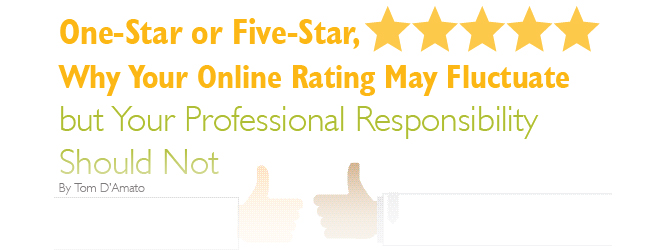
One-Star or Five-Star, Why Your Online Rating May Fluctuate but Your Professional Responsibility Should Not
Hailed by some as a landmark decision for free speech on the internet, the California Supreme Court in Hassell v. Bird (2018) 5 Cal.5th 522 found that Yelp could not be judicially ordered to remove negative, even defamatory, online reviews. Facebook, Microsoft and Twitter argued in their amicus letter that online communities “are instrumental in how modern society communicates.” Eric Goldman, an expert on technology and marketing law at Santa Clara University, was quoted in the Los Angeles Times saying that Hassell “has gotten the attention of everyone who’s anyone in the user-generated content space.” Aaron Schur, Deputy General Counsel for Yelp, claimed the case “threatened the rights of online platforms that allow people to freely share their thoughts and the billions of people that do so.”
What was it, however, that set the stage for defenders of free speech to claim a victory of this magnitude? The answer: one online complaint by one disgruntled client against one San Francisco based personal injury attorney. Yelp and other online platforms, such as Google reviews and Avvo, are available to anyone with internet access to provide a forum for reviews and ratings of lawyers and law firms. In 2016, a Pew Research Center study concluded that 82 percent of American adults say they sometimes or always read online reviews for new purchases and more than two-thirds of regular review readers believe that the reviews are “generally accurate.” The Forbes Agency Council concluded that customer reviews are among consumers’ most trusted ways to vet a product or service, with 84 percent of their study respondents saying they trust online reviews as much as they do personal recommendations. Consumer research also indicates that negative reviews, in particular, dramatically influence buying behavior. There is reason to believe that consumer behavior for non-legal products and services is applicable to the very competitive market for legal services. In fact, a whitepaper by Avvo found that 95 percent of legal consumers say online reviews matter in helping decide who to hire, and nearly half of legal consumers say reviews are “very important.”
In the case of Dawn Hassell, there were early warning signs in her representation of Ava Bird which lead her firm to withdraw in the first 25 days. Several months later, the client posted a one-star review of Ms. Hassell’s law firm on Yelp. Ms. Bird’s review claimed that Ms. Hassell’s representation “made a bad situation much worse,” opined that Ms. Hassell had a “lack of work ethic,” appeared to disclose confidential attorney client communications and warned readers to “STEER CLEAR OF THIS LAW FIRM.” Given what we know about the potential impact of negative online reviews, it is not unreasonable that attorney Hassell wanted to take action. What if, instead of filing a defamation lawsuit, the negatively reviewed lawyer took to the internet herself to post a public response to the client review?
Generally, an attorney is not ethically barred from responding to an online review by a former client. Ethics opinions from the Los Angeles County Bar Association (“LACBA”) and the Bar Association of San Francisco (“BASF”) concluded under circumstances analogous to the Hassell case that an attorney may publicly respond to an online review from a former client. (See LACBA Ethics Opinion No. 525 and BASF Ethics Opinion 2014-1.)
In reaching its opinion in 2012, the LACBA did not distinguish between responding to a former client’s negative review pertaining to a concluded matter and a negative review pertaining to an ongoing matter. The opinion of the BASF did, however, contemplate a negative review by a former client pertaining to an open matter. In its opinion, the BASF cautioned if the matter “has not concluded, a response, even one that does not disclose any confidential information, may be inappropriate.” After the conclusion of the attorney-client relationship, an attorney continues to owe a residual duty of loyalty to a former client, which is narrow in scope. The lawyer may not act in any manner that will injure the former client with respect to the matter involved in the prior representation. (See ex. Oasis West Realty, LLC v. Goldman (2011) 51 Cal.4th 811, 821.) Certainly, one can foresee that an attorney’s public response to a negative review about a prior representation in an ongoing matter could injure the former client.
Whether the former client’s matter is concluded or not, in the absence of a waiver of confidentiality in Business & Professions Code section 6068(e)(1) and Rules of Professional Conduct, Rule 1.6, an attorney may not disclose any confidential information in responding to the review. A lawyer’s duty of confidentiality survives the conclusion of the attorney-client relationship. (See ex. Wutchumna Water Co. v. Bailey (1963) 216 Ca. 564, 571; see also General Dynamics Corp. v. Superior Ct. (1994) 7 Cal.4th 1164, 1190 (“Except in those rare instances when disclosure is explicitly permitted or mandated by an ethics code provision or statute, it is never the business of the lawyer to disclose publicly the secrets of the client.”)
If a response is otherwise permitted, an ethical lawyer would be wise to show restraint and narrowly tailor their response to the specific issues raised by the negative review. Information that is irrelevant or disclosure for the purpose of harassing or embarrassing a former client, even where there is a waiver of confidentiality, may subject an attorney to discipline. (See Dixon v. State Bar (1982) 32 Cal.3d 728, 735.) Of course, when making any communication concerning a lawyer’s services, a lawyer shall not make any false or misleading statements. (See RPC 7.1(a).)
In sum, an attorney may generally respond to a former client’s internet post about a closed matter if the attorney’s response (1) does not reveal any client confidences, (2) does not injure the former client in a matter involving the attorney’s former representation, (3) is narrowly tailored and (4) is not false or misleading.